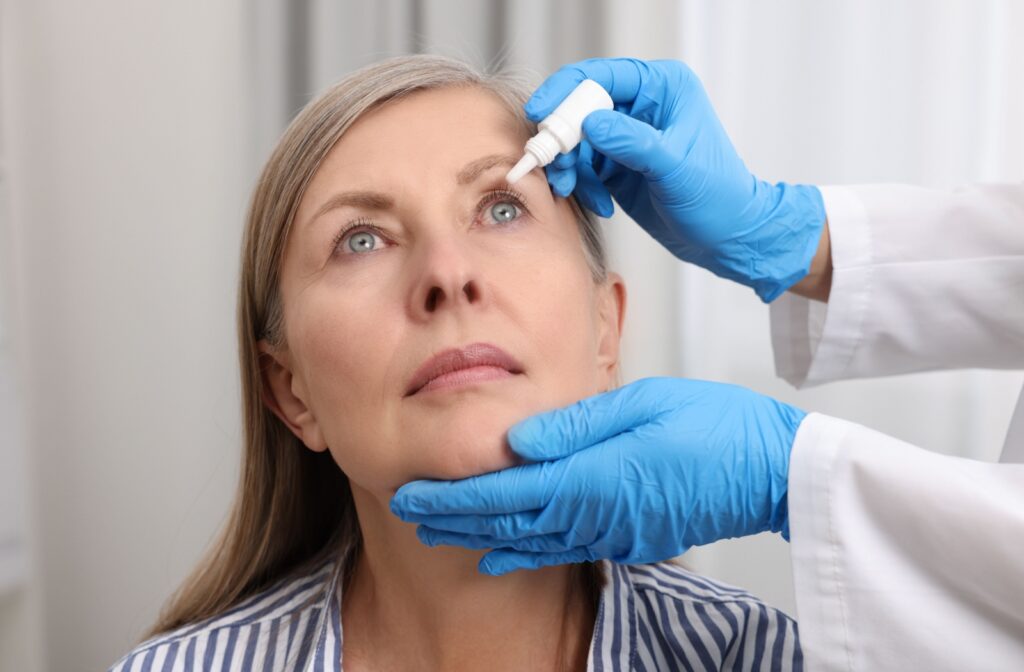Meibomian Gland Dysfunction (MGD) can be an overwhelming experience for anyone dealing with it. From the constant dry, gritty feeling in your eyes to the frustrating impact it can have on your daily life, understanding MGD can go a long way in helping you manage it effectively.
But one of the most common questions people ask is, “How long does MGD last?” Meibomian Gland Dysfunction can last anywhere from a few weeks to being a chronic condition. The duration depends on several factors.
Signature Eye Care is here to help you better understand this condition, exploring the causes, symptoms, duration, and treatments available!
What Is Meibomian Gland Dysfunction?
At its core, MGD is a condition affecting the meibomian glands in your eyelids. These glands are responsible for secreting oils into your tears, which help prevent tear evaporation. When these glands don’t work properly—whether due to blockage, inflammation, or dysfunction—the result is often insufficient oil production. This can lead to dryness, irritation, and other uncomfortable symptoms in your eyes.
MGD is one of the leading causes of dry eye syndrome, impacting millions of people worldwide. Diagnosing and managing it early can help reduce its effects on your quality of life.
Symptoms of MGD
MGD symptoms vary from mild discomfort to significant disruption in your vision and daily tasks. Common signs include:
- Dry eyes or a gritty sensation
- Blurry vision
- Burning or stinging eyes
- Watery eyes (your eyes may overcompensate for dryness by producing excess tears)
- Sensitivity to light
- Red or swollen eyelids
These symptoms can occur intermittently or persist if left untreated, making it essential to tackle the underlying cause.
Common Causes of MGD
Several factors may contribute to the development of meibomian gland dysfunction. These include:
- Lifestyle factors: Prolonged screen time, environmental stressors, or inadequate eyelid hygiene.
- Chronic conditions: Conditions like rosacea or blepharitis often go hand-in-hand with MGD.
- Aging: The meibomian glands naturally become less effective over time.
- Hormonal changes: MGD is more likely during periods of hormonal fluctuation, such as menopause.
- Contact lens wear: Regular use of contact lenses can alter the composition of your tears.
By identifying and addressing the root causes, you can take steps toward lasting relief.
How Long Does MGD Last?
The duration of MGD can vary significantly depending on several factors, including the severity of the condition, early diagnosis, and the treatment approach.
Acute Cases
For some, MGD may present as a one-time issue triggered by a specific factor, such as an allergic reaction or environmental irritant. With prompt treatment, such temporary cases may resolve within a few weeks to a few months.
Chronic MGD
However, MGD is more often a chronic issue, especially if it stems from underlying conditions or lifestyle habits. Chronic MGD doesn’t disappear entirely, but it can usually be managed effectively with consistent care. The key is to focus on mitigating symptoms and preventing further gland damage. With the right treatment plan, many people experience periods of significant improvement and relief from symptoms, sometimes lasting for months or years.
Factors That Influence Duration
Several elements play a role in how long MGD persists:
Severity:
Mild cases typically clear up faster, while more severe blockages or inflammation may take longer to address.
Treatment adherence:
Following a recommended treatment regimen can significantly cut down on symptom duration.
Lifestyle changes:
Addressing contributing factors like diet, screen-time habits, and hygiene can accelerate relief.
Underlying conditions:
Co-existing issues like blepharitis or rosacea may prolong recovery times if not treated.

How Can You Treat MGD?
The good news is that MGD is treatable, and there are many options to help improve gland function and relieve symptoms. A combination of remedies, professional care, and lifestyle adjustments can make a world of difference.
At-Home Care
- Warm Compresses: Applying warm, moist heat to your eyelids can help unblock meibomian glands and improve oil flow.
- Lid Hygiene: Gently cleaning your eyelids with specific eyelid wipes or cleaners like Ocusoft can reduce inflammation and bacteria.
- Hydration: Drinking plenty of water and using a humidifier in your living space can help keep your eyes moist.
- Omega-3 Fatty Acids: Adding omega-3-rich foods like salmon to your diet may support healthier tear production.
- PRN De3 Dry Eye Omega Benefits are oral omega-3 supplements crafted to support the production of a healthy tear film in the eyes. This unique formulation and concentration of Omega 3 are specifically tailored to alleviate dry eye symptoms by supplying the body with a natural oil it cannot produce on its own and aiding in unclogging the glands.
Professional Treatments
If your MGD persists, it’s crucial to consult an eye care professional for further treatment options. At Signature Eye Care, our experienced optometrists offer dry eye therapy tailored to your needs. Here is the best treatment we recommend for MGD:
- A combination treatment with Optilight IPL using Intense Pulsed Light to break up the clogged oils and inflammation followed by Tempsure Envy RF using Radio Frequency providing a deep penetrating heat to melt away the oil in the clogged glands.
*These treatments are backed by research and Optilight IPL is FDA approved.
Why Seek Professional Help?
While some MGD cases can be managed at home, ongoing symptoms or severe discomfort indicate the need for professional care. Some advanced cases—even in their early stages—can lead to permanent gland damage if left untreated. Early intervention from experienced professionals, like those at Signature Eye Care, is key to preserving not only gland function but also your overall eye health.
Our team takes a holistic approach, offering a comprehensive dry eye assessment and treatments that address your unique needs. With our support, you’ll find lasting relief and be able to reclaim your eye comfort.
Take Steps Toward Healthier Eyes
Whether your MGD lasts weeks or becomes a chronic condition, you don’t have to face it alone. With the right combination of treatment, lifestyle changes, and professional guidance, you can reduce discomfort and maintain healthy eyes over the long term. Book an appointment with us at Signature Eye Care, and our skilled optometrists will help you find the relief you deserve.
Your eyes matter, and taking steps now to treat MGD can prevent further complications and significantly improve your quality of life. Don’t wait—invest in your eye health today!



